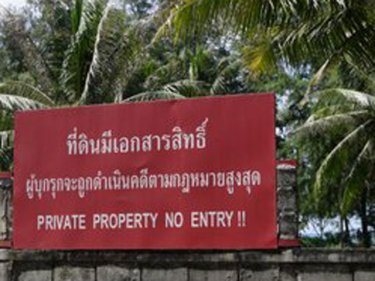That big brand gulp puts more than a million rooms inside one corporate entity. Where will it end?
Phuketwan has recently visited Samui, Penang and Phi Phi, and found that all these regional holiday destinations have similar problems to Phuket.
Driven by popularity, tropical islands with appeal to tourists are confronting issues that include pollution, doubts about future water and power supplies, infrastructure that fails to keep pace, and a loss of green space.
Whatever vacant fringes remain along Phuket's shorefront are being eyed for development - mostly by resorts or property developers that nowadays also include resorts.
We've watched some great resorts that have been constructed and opened around Phuket, Krabi and Phang Nga over the past decade.
We are sure all of them offer employment to scores of people and pay their taxes.
But it's now becoming increasingly important to ask the question: Where will it end?
Tourism officials, including the Tourism Minister, are to gather on Phuket this weekend to look at some of the ''cluster'' issues that are produced by the insatiable, unstoppable growth of the tourism industry.
That growth must end some day - when all the available space on Phuket, on Phi Phi, on Penang and on Samui has been gobbled up.
With new products such as airbbnb, which provides ''local hosts'' and now has a stock exchange value of $25 billion, the nature of travel will continue to change.
But it is nature that is disappearing because of the capitalist imperative for constant growth and profit.
We have given up responding to invitations to go to beach parties and to new resort openings, or to note the good corporate social responsibility work being performed.
There is no shortage of wonderful resorts, wonderful beach clubs and wonderful projects.
There is, however, an increasing shortage of green spaces along the coastline of Phuket and the other islands we have visited recently.
Resorts are even being constructed now on the seaward side along Phuket's west coast road in places we once thought building would either be impossible or illegal.
The next holy grail for resort brands with an eye to holiday islands will be Myanmar, where the entire country as of September had a mere 48,425 hotel rooms.
Green fields, the corporate gurus call it, with a touch more irony these days.
Recently on Phi Phi we interviewed environmentalist and activist Dr Thon Thamrongnawasawat, who is doing his best to save Phi Phi's coral reefs from destruction.
The problem: the reefs are too popular and so their survival can no longer be guaranteed.
We suggested to Dr Thon that the entire Andaman region needed a brake on development, and that Thailand's government could do this most effectively by insisting that future developers provide their own water supplies and at least 20 percent of their own power.
''The idea won't work,'' he said. ''The price of land in coastal regions is already outrageous.
''But big money from China is being invested as the Chinese become the most powerful force in tourism, and no price is too great for them to pay.''
Where will it end? Who knows.





Good article.
Sadly it won't end. Corporate greed will make sure of that. With more & more large multinational brands jumping on the bandwagon, the greenery is rapidly becoming swallowed up.
The personal touch of smaller family run resorts has gone too. For years my family used a very centralised hotel in Karon. The it started to grow & grow & grow. The quality of staff deteriorated & with few exceptions, the personal touch was gone.
My family moved on to another very nicely run family hotel in Kata where the staff was brilliant. Sadly the owner passed away & it was sold & swallowed up by a bigger enterprise across the road. Bookings were not honoured & the personal touch again was lost.
My family has now stopped visiting Phuket, preferring Chiang Mai & other parts of Thailand - or even other countries where the friendly personal touch is still evident.
Posted by Logic on November 18, 2015 11:50
Editor Comment:
The friendly personal touch is what all big brands also strive to achieve but it's not easy.